113 books about Selected Poems and 8
start with W
113 books about Selected Poems and 8
113 books about Selected Poems
8 start with W start with W
8 start with W start with W
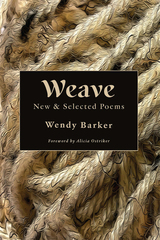
Weave
New and Selected Poems
Wendy Barker
BkMk Press, 2022
Weave: New and Selected Poems showcases poems from Barker’s long career that includes selections from her seven previous full-length collections, as well as new work. The collection features a wide range of subjects and themes, notable among them the poet’s perspectives as an educator (especially in the very real-world concerns of the urban English classroom), surprises and wonders in her family’s past and present, and the hope, fear, and trenchant wit with which she sees the world around us.
[more]
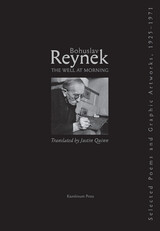
The Well at Morning
Selected Poems, 1925–1971
Bohuslav Reynek
Karolinum Press, 2017
Springtide
A chaffinch in a tree
of cherry sings merrily
spring’s introit.
Its blazing bobble dwells
in leaves, alive, and swells
in scarlet.
The flowers are flares of white.
The chaffinch has gone quiet
and turned sky-gazer.
My eyes close on the day:
an orb revolves in grey
and red and azure.
Poet and artist Bohuslav Reynek spent most of his life in the relative obscurity of the Czech-Moravian Highlands; although he suffered at the hands of the Communist regime, he cannot be numbered among the dissident poets of Eastern Europe who won acclaim for their political poetry in the second half of the twentieth century. Rather, Reynek belongs to an older pastoral-devotional tradition—a kindred spirit to the likes of English-language poets Gerard Manley Hopkins, William Wordsworth, Robert Frost, and Edward Thomas. The Well at Morning presents a selection of poems from across his life and is illustrated with twenty-five of his own color etchings. Also featuring three essays by leading scholars that place Reynek’s life and work alongside those of his better-known peers, this book presents a noted Czech artist to the wider world, reshaping and amplifying our understanding of modern European poetry.
A chaffinch in a tree
of cherry sings merrily
spring’s introit.
Its blazing bobble dwells
in leaves, alive, and swells
in scarlet.
The flowers are flares of white.
The chaffinch has gone quiet
and turned sky-gazer.
My eyes close on the day:
an orb revolves in grey
and red and azure.
Poet and artist Bohuslav Reynek spent most of his life in the relative obscurity of the Czech-Moravian Highlands; although he suffered at the hands of the Communist regime, he cannot be numbered among the dissident poets of Eastern Europe who won acclaim for their political poetry in the second half of the twentieth century. Rather, Reynek belongs to an older pastoral-devotional tradition—a kindred spirit to the likes of English-language poets Gerard Manley Hopkins, William Wordsworth, Robert Frost, and Edward Thomas. The Well at Morning presents a selection of poems from across his life and is illustrated with twenty-five of his own color etchings. Also featuring three essays by leading scholars that place Reynek’s life and work alongside those of his better-known peers, this book presents a noted Czech artist to the wider world, reshaping and amplifying our understanding of modern European poetry.
[more]
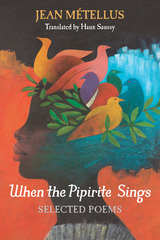
When the Pipirite Sings
Selected Poems
Jean Métellus, Translated by Haun Saussy
Northwestern University Press, 2019
When the Pipirite Sings gathers poems by the noted Haitian poet, novelist, and neurologist Jean Métellus, who died in January 2014. Along with other signature works, this volume includes the first English translation of Métellus’s visionary epic poem, “Au pipirite chantant” (“When the Pipirite Sings”), widely regarded as his masterpiece.
Translated by formidable comparative literature scholar Haun Saussy, When the Pipirite Sings expresses an acute historical consciousness and engages recurrent Haitian themes—the wrenching impact of colonialism and underdevelopment, the purposes of education, and the merging of spiritual and temporal power. And, as always with Métellus’s poetry, the range of voices and points of view evokes other genres, including fiction and cinema. This eminently readable book has formal and thematic ties to Aimé Césaire’s Notebook of a Return to the Native Land, central to the canon of French-language postcolonial writings.
In addition to many books of poetry, Métellus published novels, chiefly about the remembered Haiti of his youth, and plays about the conquest of the Caribbean. His nonfiction included reflections on Haitian history and politics, on the iconography of slave emancipation, and studies of aphasia and dyslexia.
Translated by formidable comparative literature scholar Haun Saussy, When the Pipirite Sings expresses an acute historical consciousness and engages recurrent Haitian themes—the wrenching impact of colonialism and underdevelopment, the purposes of education, and the merging of spiritual and temporal power. And, as always with Métellus’s poetry, the range of voices and points of view evokes other genres, including fiction and cinema. This eminently readable book has formal and thematic ties to Aimé Césaire’s Notebook of a Return to the Native Land, central to the canon of French-language postcolonial writings.
In addition to many books of poetry, Métellus published novels, chiefly about the remembered Haiti of his youth, and plays about the conquest of the Caribbean. His nonfiction included reflections on Haitian history and politics, on the iconography of slave emancipation, and studies of aphasia and dyslexia.
[more]
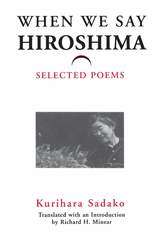
When We Say “Hiroshima”
Selected Poems
Kurihara Sadako; Translated with an Introduction by Richard H. Minear
University of Michigan Press, 1999
Kurihara Sadako is one of the poetic giants of the nuclear age. Born in Hiroshima in 1913, she was in Hiroshima on August 6, 1945. From then till now she has addressed her poetry primarily to issues of nuclear destruction, nuclear weapons, and nuclear power. Herself a victim of the world’s first nuclear attack, she became the poetic conscience of the Hiroshima that was no more. But Kurihara turned her attention soon to more controversial issues, including Japan’s role as victimizer in World War II. Many of her poems attack the Japanese government and its policies then and now.
When We Say “Hiroshima” contains a selection of the poems Kurihara wrote between 1942 and 1989. They include meditations on death, on survival, on nuclear radiation, on Japanese politics, on American foreign policy, and on women’s issues.
[more]
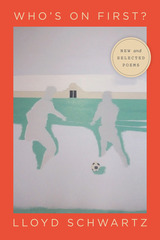
Who's on First?
New and Selected Poems
Lloyd Schwartz
University of Chicago Press, 2021
New and selected poems by renowned poet Lloyd Schwartz.
For more than four decades, readers and critics have found Lloyd Schwartz’s poems unlike anyone else’s—a rare combination of the heartbreaking and the hilarious. With his ear for the poetry of the vernacular, Schwartz offers us a memorable cast of characters—both real and imagined, foolish and oracular. Readers experience his mother’s piercing flashes of memory, the perverse comic wisdom of Gracie Allen, the uninhibited yet loving exhibitionists of antique pornography, and eager travelers crossing America in a club-car or waiting in a Brazilian airport. Schwartz listens to these people without judging—understanding that they are all trying to live their lives, whenever possible, with tenderness, humor, and grace.
Who’s on First? brings together a selection of poems from all of Schwartz’s previous collections along with eagerly awaited new poems, highlighting his formal inventiveness in tangling and untangling the yarn of comedy and pathos. Underlying all of these poems is the question of what it takes and what it costs to make art.
For more than four decades, readers and critics have found Lloyd Schwartz’s poems unlike anyone else’s—a rare combination of the heartbreaking and the hilarious. With his ear for the poetry of the vernacular, Schwartz offers us a memorable cast of characters—both real and imagined, foolish and oracular. Readers experience his mother’s piercing flashes of memory, the perverse comic wisdom of Gracie Allen, the uninhibited yet loving exhibitionists of antique pornography, and eager travelers crossing America in a club-car or waiting in a Brazilian airport. Schwartz listens to these people without judging—understanding that they are all trying to live their lives, whenever possible, with tenderness, humor, and grace.
Who’s on First? brings together a selection of poems from all of Schwartz’s previous collections along with eagerly awaited new poems, highlighting his formal inventiveness in tangling and untangling the yarn of comedy and pathos. Underlying all of these poems is the question of what it takes and what it costs to make art.
[more]
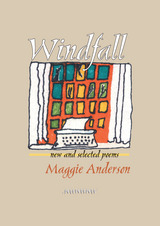
Windfall
New and Selected Poems
Maggie Anderson
University of Pittsburgh Press, 2000
Windfall includes poems from three previous books by Maggie Anderson, along with a generous selection of new work. In this collection we can see over two decades of the growth of a poet memorable for the clarity, strength, and urgency of her voice. Anderson’s poems entangle a language, a history, and a group of belongings, and she is both at home and a foreigner in the places she invokes. Every place in these poems seems inhabitable, yet the tensions of these deceptively quiet lines develop out of the clear reluctance or inability of the poet to sit still. Maggie Anderson writes out of deep grief for the political losses of work and money, of life and limb and home in our dangerous times. She remembers and witnesses, and she also speaks eloquently for our private griefs—the loss of family, vitality and self. These poems do not shout; we listen as if following a whisper in the dark. A counterpoint to the sorrows in these poems is a complex and often joyous music, as well as a wry, sometimes self-deprecating humor which saves the work from solemnity. Her rhythms are diverse and intricate; they move deftly from fiddle whine to saxophone, from fugue to blues.
[more]
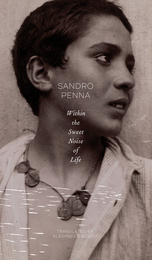
Within the Sweet Noise of Life
Selected Poems
Sandro Penna
Seagull Books, 2020
Widely considered to be among the most important Italian poets of the twentieth century, Sandro Penna was born and raised in Perugia but spent most of his life in Rome. Openly gay, Penna wrote verses celebrating homosexual love with lyrical elegance. His writing alternates between whimsy and melancholia, but it is always full of light.
Juggling traditional Italian prosody and subject matter with their gritty urban opposites in taut, highly concentrated poems, Penna’s lyrics revel in love and the eruption of Eros together with the extraordinary that can be found within simple everyday life. There is something ancient in Penna’s poetry, and something Etruscan or Greek about the poems, though the landscape is most often of Rome: sensual yet severe, sinuous yet solid, inscrutable, intangible, and languorous, with a Sphinx-like and sun-soaked smile. Penna’s city is eternal—a mythically decadent Rome that brings to mind Paris or Alexandria. And though the echoes resound—from Rimbaud, Verlaine, and Baudelaire to Leopardi, D’Annunzio, and Cavafy—the voice is always undeniably and wonderfully Penna’s own.
Juggling traditional Italian prosody and subject matter with their gritty urban opposites in taut, highly concentrated poems, Penna’s lyrics revel in love and the eruption of Eros together with the extraordinary that can be found within simple everyday life. There is something ancient in Penna’s poetry, and something Etruscan or Greek about the poems, though the landscape is most often of Rome: sensual yet severe, sinuous yet solid, inscrutable, intangible, and languorous, with a Sphinx-like and sun-soaked smile. Penna’s city is eternal—a mythically decadent Rome that brings to mind Paris or Alexandria. And though the echoes resound—from Rimbaud, Verlaine, and Baudelaire to Leopardi, D’Annunzio, and Cavafy—the voice is always undeniably and wonderfully Penna’s own.
[more]
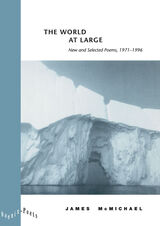
The World at Large
New and Selected Poems, 1971-1996
James McMichael
University of Chicago Press, 1996
The World at Large brings together the best of James McMichael's poetry and includes works that appear for the first time in this volume. With the publication of the new poems, McMichael surpasses even the formally daring and psychologically penetrating poetry that has characterized his work thus far.
[more]
READERS
Browse our collection.
PUBLISHERS
See BiblioVault's publisher services.
STUDENT SERVICES
Files for college accessibility offices.
UChicago Accessibility Resources
home | accessibility | search | about | contact us
BiblioVault ® 2001 - 2024
The University of Chicago Press









